#District of Columbia v. Heller
Text
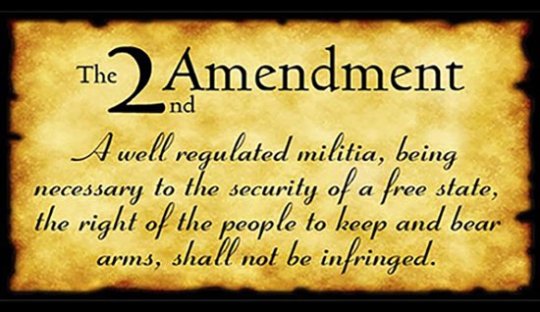
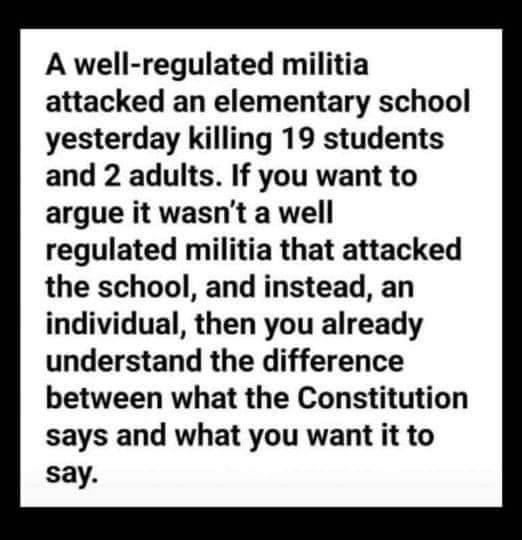
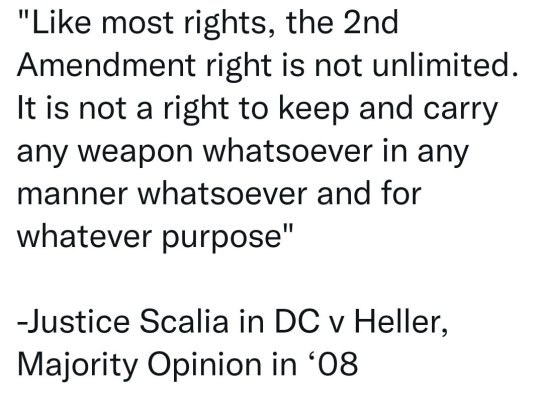
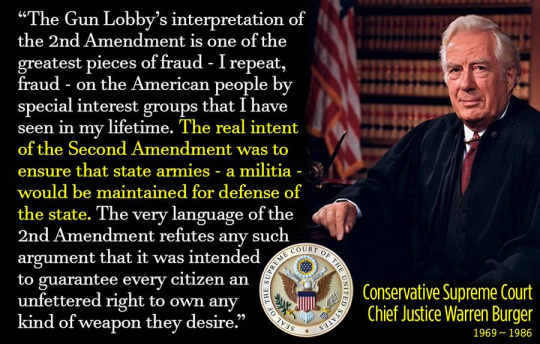
#us politics#us constitution#2nd amendment#gun violence#gun control#gun rights#mass shooters#mass shootings#school shootings#uvalde shooting#justice antonin scalia#District of Columbia v. Heller#us supreme court#scotus#chief justice warren burger#quotes#conservatives#Republicans#can conservatives read? challenge#2022#nra#national rifle association#gun lobby
57 notes
·
View notes
Text
Illinois Attorney General Kwame Raoul on Thursday filed a brief defending Illinois’ assault weapon ban, arguing the weapons restricted by the newly enacted law aren’t commonly used for self-defense and that large capacity magazines are accessories — not “arms.”
It also argues the country’s founding fathers owned guns that could only fire a single shot before reloading — proving assault weapons and large capacity magazines weren’t in “common use” when the Constitution was ratified.
“The assault weapons restricted by the Act are not commonly used for self-defense; by design and in practice, they exist for offensive infliction of mass casualties,” the brief states.
It also argues the term “arms” refers to weapons and not “accessories,” and that large capacity magazines are therefore not protected under the Second Amendment’s right to bear arms.
Those are among the key arguments in a 72-page brief filed by Raoul, Gov. J.B. Pritzker and Illinois State Police Director Brendan Kelly in the Southern District of Illinois — in response to challenges to the ban in four federal lawsuits that were consolidated on Feb. 24.
Pritzker on Jan. 10 signed legislation that bans the sale of assault weapons and caps the purchase of magazines at 10 rounds for long guns and 15 for handguns. It also makes rapid-fire devices known as switches illegal because they turn firearms into fully automatic weapons.
Two key U.S. Supreme Court decisions are shaping the legal arguments around such bans. Thursday’s brief references them both, known as the Bruen and Heller decisions.
In the 2022 Bruen case, the high court’s 6-3 ruling required judges to rely on the Second Amendment’s text and the history of gun regulation to decide the constitutionality of gun laws — and not on the strength of the public safety purpose of those laws.
And in the 2002 Heller decision, the Supreme Court found that the Second Amendment guarantees the right to “possess and carry arms in case of a confrontation.” That ruling struck down a ban on handguns in Washington, D.C.
The brief filed Thursday states that Heller acknowledged handguns are “the quintessential self-defense weapon” and called M-16 rifles “weapons that are most useful in military service.”
“The Act regulates weapons and accessories like those categorically marked as unprotected in Heller,” the brief argues in its defense of the Illinois ban. “That is why it does not infringe the Second Amendment.”
In the Bruen ruling, whose opinion was written by Justice Clarence Thomas, restrictions on weapons must be limited to dangerous and unusual arms that aren’t commonly used. Opponents, including the National Association for Gun Rights, have argued the weapons banned by the Illinois law are “unquestionably” in common use.
The state’s response argues otherwise.
“The Second Amendment’s text protects only arms in common use at the time the Second or Fourteenth Amendments were ratified, or those commonly used for individual self-defense today,” the brief says. “Plaintiffs cannot show the Act violates the Second Amendment because it regulates weapons designed for war, not self-defense.”
The federal suits, now consolidated, were filed by Illinois residents who own assault weapons and large capacity magazines, businesses that want to continue selling those items and gun rights and advocacy organizations. They are seeking a preliminary injunction prohibiting the defendants from enforcing the act, specifically limitations on the purchase and sale of assault weapons and large capacity magazines.
A number of state lawsuits have also challenged the ban, with most claiming it violates the Illinois Constitution. Some of the suits have resulted in temporary restraining orders — but only blocking enforcement of the ban against the gun owners and other plaintiffs who filed the suits.
Thursday’s brief notes that the only Court that has considered whether the ban infringes on the Second Amendment has already ruled that it does not. U.S. District Judge Virginia Kendall on Feb. 17 ruled that the Illinois and Naperville bans on selling assault weapons are “constitutionally sound.”
#us politics#news#Illinois#2023#gov. j.b. pritzker#chicago sun times#Kwame Raoul#assault weapon ban#high capacity magazine ban#founding fathers#us constitution#gun rights#gun control#gun violence#2nd amendment#second amendment#Brendan Kelly#new york state rifle & pistol association v. bruen#nysrpa v. bruen#District of Columbia v. Heller#Justice Clarence Thomas#National Association for Gun Rights#14th amendment#fourteenth amendment#Illinois Constitution#Judge Virginia Kendall
14 notes
·
View notes
Text
New Post has been published on Books by Caroline Miller
New Post has been published on https://www.booksbycarolinemiller.com/musings/the-shadow-knows/
The Shadow Knows

During the winter holidays, Britain’s Prime Mister, Rishi Sunak took a photo-op when he decided to serve breakfast at a homeless shelter. Sunak, reported to be worth $800 million, made a stab at being chummy as he handed a plate of eggs and sausages to a stranger standing on the opposite side of the steam counter. “Do you work in business, by any chance?” As the man reached for the plate that hung in midair, he stated the obvious. “No. I’m homeless. I’m here for a hot meal.” Finding common ground with a stranger can be difficult. Sometimes, it never happens. Sometimes connection takes a second. Since arriving in Congress (2021), House Republican Marjorie Taylor Green has engaged her Democratic associate Jaime Raskin in Twitter combat. No one could have guessed they were linked by a thread. Yet when Raskin announced he had cancer, Greene did an about-face. Her father had died of cancer. She knew the struggle that awaited her colleague. “I’ll be praying for Jaime Raskin,” she tweeted. Empathy is a grace that exists in most humans. It lifts us into spiritual realms but is ephemeral. Called upon too often or for too long a time, the flame dies out. Prolonged empathy morphs into grief; grief becomes despair; despair, falling alike upon those who suffer and those who help, leaves the spirit numb. insanity is the final transition. The Ukraine war is an example. The nation may be winning its battles, but its rubbled streets look nothing like a victory. How long will the people’s courage last and that of their supporters? Longer than the invaders’, I hope. Seeing his country mired in blood, one Russian propagandist’s despair touches upon insanity. Embrace death he exhorted his countrymen. “Life is highly overrated.” History is rife with nihilists like him. It is a state of mind as old as Biblical Masada and jihadism. In times of greatest stress, it can pass for Reason. Recently, the U. S. Supreme Court struck down New York’s gun control laws which were intended a cripple the growing number of mass shootings. The judges concluded that under the Second Amendment, the legislation violated the people’s right to protect themselves. That decision was based on its 2008 verdict in the District of Columbia v. Heller. There, the judges determined that “militia” in the Second Amendment covered an individual’s right to self-defense. Though reasonable on its face, the interpretation leaves citizens standing in crosshairs. One commentator rightly asked, “What happens when the people are no longer allowed to protect themselves from mass slaughter through their elected representatives and are left at the mercy of unelected judges who do not care if they are shot to death.” The marshmallow experiment reminds us that our human tendency is to secure what we have rather than plan for future unknowns. The impulse can goad us into precipitous action. In the 1990s, the United States may have acted impulsively when President Bill Clinton encouraged Urkaine’s desire for ties with Europe. Political scientist John Mearsheimer says Clinton’s decision destroyed a détente between Russia and the west and paved the way for Vladimir Putin’s invasion of its neighbor. Clinton disagrees. Graham Fuller, a political analyst, sides with Mearsheimer on the question and sees Ukraine’s struggles as a proxy war between the U. S. and Russia. He says we are making a similar mistake with China he continues. Our efforts to restrict that country’s growth have backfired, leading China to respond with its Belt and Road initiative —an economic development plan for third-world countries that China underwrites. The program has enjoyed success, particularly among nations in the southern hemisphere that have experienced the west’s military presence: Latin American, the Middle East, Africa, India, and parts of Asia. Finger-pointing, of course, is among the oldest ploys. At this moment, however, it poses danger because it diverts our attention from Damocles’s sword as it swings above our heads. I refer to climate change. In a recent version of nihilism, some scientists have abandoned the hope that we can escape annihilation. Those of us who dare to contemplate the future know that Marjorie Taylor Greene and Jamie Raskin have revealed the common ground that unites the species. Who becomes Speaker of the U. S. House in 2023 is irrelevant. At a visceral level, we know our charge. Either we work toward the common good. Or, we nurture our grudges and fall victim to the lengthening shadow of our annihilation.
#Bill Clinton#causes of the Ukranian war#China's Belt and Road initiative#Climate change#detante#District of Columbia v. Heller#Graham Fuller#gun control#humanity's future#Jaime Raskin#Jihadism#John Mearsheimer#Majorie Taylor Green#Masada#New York gun contgrol laws#nihilism#Rishi Sunak#The Second Amendment and gun rightsn#U. S. Supreme Court#Ukraine's war#Vldimir Putin
2 notes
·
View notes
Text
Saying there's nothing we can do is not a serious answer
Saying there’s nothing we can do is not a serious answer
Two Sundays ago, I walked out of the airport terminal in Boise and stopped to gawk at the sticker on an entrance door. Illustrated with a picture of an anxious cartoon handgun, it warned travelers of the mininum $3,920 fine waiting if they tried to take a firearm through security. Then I saw a second sign with the same message on the doors leading from a parking garage to the terminal.
But on…

View On WordPress
#2A#Buffalo#culture of safety#District of Columbia v. Heller#harm reduction#public health#Second Amendment#Uvalde
1 note
·
View note
Text
Do not actually shoot members of the Supreme Court with the very guns they refused to regulate.
#yes they willingly and boldly walked right into 'villain killed by the monster they abused' territory#supreme court#roe v wade#district of columbia v heller#YOU DIDN'T CARE ABOUT KIDS WHEN THEY WERE GETTING SHOT
1 note
·
View note
Text
So I guess precedent no longer matters. Rights upheld by the Supreme Court can be easily taken away by new judges that disagree for no reason other than the fact they want to.
This sucks for the US this sucks for the rights of the vulnerable people within in. No doubt. And I hate it.
But there is a post going around on Tumblr to never use a weapon that you don't want used against you. So maybe the Right should take that to heart.
2008
District of Columbia vs. Heller
That's the ruling that said the second amendment applied to individuals. Before that the common conception of the second amendment was that it only applied to state militias.
But if precedent no longer applies. If rights granted by the Supreme Court are no longer fixed...
Well. Perhaps it's time for some gun reform. Real strict gun reform. Because if the precedent of Roe v. Wade does not matter, no Supreme Court precedent matters. Including District of Columbia v. Heller, and including this decision they just handed down.
#supreme court#roe v wade#district of columbia v Heller#united states#politics#The supreme court is supposed to protect the rights of the vulnerable from legislative overreach#The court is not doing it's job
1 note
·
View note
Text
“Teaching constitutional law today is an enterprise in teaching students what law isn’t,” Leah Litman, a professor at the University of Michigan law school, told me.
Rebecca Brown, at the University of Southern California, has been teaching constitutional law for 35 years. “While I was working on my syllabus for this course, I literally burst into tears,” she told me. “I couldn’t figure out how any of this makes sense. Why do we respect it? Why do we do any of it? I’m feeling very depleted by having to teach it.”
At least she’s still trying. Larry Kramer, a widely-respected legal scholar and historian who was my constitutional law professor at N.Y.U. 20 years ago, called it quits in 2008, on the heels of the Supreme Court’s divisive decision in District of Columbia v. Heller, which struck down decades of precedent to declare for the first time that the Second Amendment protects an individual right to bear arms. Many observers felt that Heller’s majority opinion, by Justice Antonin Scalia, intentionally warped history to reach a preordained result.
Professor Kramer was the dean of Stanford law school at the time, but after the Heller ruling, he told me recently, “I couldn’t stand up in front of the class and pretend the students should take the court seriously in terms of legal analysis.” First-year law students, he felt, “should be taught by someone who still believed in what the court did.”
Regime indoctrinators losing faith in obviously phony ruling ideology
328 notes
·
View notes
Photo





Another elementary school shooting in the U.S.
Heartbreaking.


When will our nation join the rest of the developed world in behaving like a civilized country regarding gun regulation?
Gun use had been regulated since the founding of our nation. Unfortunately, that all changed with the conservative Supreme Court’s decision to overturn 200 + years of precedent in the 2008 District of Columbia v. Heller decision that reinterpreted the Second Amendment to mean that there is an individual right to bear arms.
The current Supreme Court is poised to continue to gut gun control laws.
The rest of the world is looking on and shaking its collective head in horror.
_________________
Photos (before edits) via The Washington Post; candle gif source (before edits)
Originally posted 05.25.22 at 7:11 am EDT; updated 05.25.22 at 11:37 pm EDT
261 notes
·
View notes
Text
District of Columbia v. Heller will be viewed with the same sorrowful contempt as Citizens United by survivors sitting on the rubble of what was once a proud, free nation.
25 notes
·
View notes
Text
Is the Supreme Court Lying When It Purports To Place Limits on its Extreme Rulings? Third Circuit: Obviously, Yes
Today, the Third Circuit sitting en banc in Range v. Attorney General invalidated federal prohibitions on possession of firearms by convicted felons, at least in cases of non-violent offenders (Range had been convicted of food stamp fraud), but potentially in many other circumstances as well (via). This creates a circuit split with the Eighth Circuit's opinion last week in United States v. Jackson that I discussed here.
The issue of felon disarmament under Bruen is interesting. At one level, it's always possible that any gun regulation might fall prey to Bruen's rigid history-or-bust methodology for determining constitutionality under the Second Amendment (though much here depends on necessarily subjective judgment regarding what counts as a proper historical analogy). But at another level, the felon prohibitions are distinct because Bruen (along with the other members of the Roberts trilogy on guns -- Heller and McDonald) were emphatic that these prohibitions should not be questioned under the Court's rulings. As Heller said: "The Court's opinion should not be taken to cast doubt on longstanding prohibitions on the possession of firearms by felons." This was reiterated in McDonald, and confirmed again in Justice Kavanaugh's Bruen concurrence.
How does the Third Circuit get around this seemingly very explicit language? By suggesting the Court cannot be trusted to mean what it says.
The court in an opinion by Judge Hardiman analogized adhering to the Supreme Court's express declaration that these laws remained constitutional to how the Court talked about the application of means-end scrutiny in Heller. Heller suggested that the law in question in that case would be unconstitutional “[u]nder any of the standards of scrutiny that we have applied to enumerated constitutional rights.” Lower courts, Judge Hardiman continued, universally "overread that passing comment to require a two-step approach in Second Amendment cases, utilizing means-end scrutiny at the second step," an approach the Supreme Court ended up disavowing in Bruen. And so the Third Circuit says, in essence, it won't make the same mistake twice: it must be "careful not to overread" the language suggesting felon disarmament laws remain constitutional "as we and other circuits did with Heller’s statement that the District of Columbia firearm law would fail under any form of scrutiny."
In other words, the basic question is: can we trust the Supreme Court when it says, expressly, "our decisions should not be read to mean felon disarmament laws are unconstitutional"? Or was that a promise the Supreme Court never meant to keep? In fairness to the Third Circuit, given the choice between predicting (a) the Supreme Court will abide by its own expressly-stated doctrinal limits or (b) the Supreme Court will completely ignore its own promises the instant they seem to sanction gun control limits the Court dislikes, I'm hard-pressed to say that option b isn't the safer bet. But there is something discomforting about lower courts openly acknowledging that the best way to interpret the Supreme Court's Second Amendment jurisprudence is to assume that any limits the high court purported to place on Bruen's sweeping protections for guns everywhere-for-everyone-at-any-time are probably just lies.
As a sidenote, I'll also just say that I literally finished compiling my Con Law II course materials on the post-Bruen Second Amendment last night, and immediately had to revise them again to account for the Range decision. Again, spare a thought for the underappreciated constitutional law professor, the forgotten victims of the churn and chaos the Supreme Court has unleashed in our constitutional jurisprudence.
via The Debate Link https://ift.tt/JNaKwdE
16 notes
·
View notes
Text
United States v. Cruikshank, 92 U.S. 542 (1876)
A case that was a hard blow to the 14th Amendment and an injustice to African Americans also was a 2nd Amendment win?
United States v. Cruikshank, 92 U.S. 542 (1876) a case about the Colfax massacre that happened on April 13, 1873, in Colfax Louisiana. Where 60-153 black men and 3 white men were killed while surrendering to a group of former Confederate soldiers and KKK members.
In the case Chief Justice Morrison Waite said in the majority opinion that the "Due Process Clause" and the "Equal Protection Clause" of the Fourteenth Amendment applied to the actions of state governments, but not to individuals.” It would not be until the 1920's that the 14th Amendment violations would start being applied against states.
In the case, the first case ever to involved a possible violation to the 2nd Amendment, the SCOTUS said:
"The right to bear arms is not granted by the Constitution; neither is it in any manner dependent upon that instrument for its existence. The Second Amendments means no more than that it shall not be infringed by Congress, and has no other effect than to restrict the powers of the National Government."
"The right there specified is that of "bearing arms for a lawful purpose." This is not a right granted by the Constitution. Neither is it in any manner dependent upon that instrument for its existence. The second amendment declares that it shall not be infringed, but this, as has been seen, means no more than that it shall not be infringed by Congress. This is one of the amendments that has no other effect than to restrict the powers of the national government, leaving the people to look for their protection against any violation by their fellow citizens of the rights it recognizes, to what is called, in The City of New York v. Miln, 11 Pet. 139, the "powers which relate to merely municipal legislation, or what was, perhaps, more properly called internal police," "not surrendered or restrained" by the Constitution of the United States."
Now this seems like a win for the current laws in states like New York and California....But, here comes the 14th Amendment for a cock block.
McDonald v. City of Chicago, 561 U.S. 742 (2010) this case concluded that the (R)ight of an individual, not a militia, was protected in the 2nd Amendment and is also incorporated by the Due Process Clause of the 14th Amendment and therefore can be enforced against States.
There is so much talk about how the 2nd Amendment is limited to 18th century firearm's, that the Founding Fathers could have never foreseen semi automatic firearms, that the text of the 2nd Amendment only applies to state sponsored militia's and defence of the state. But even without adding District of Columbia v. Heller, 554 U.S. 570 (2008) into the mix case law as laid out by the SCOTUS points to the 2nd Amendment, in it's unadulterated form, is meant for the individual and the individuals ability to provide their own self defence, it's really that simple.
It's not about hunting, it's not about target shooting, it's not about days at the gun club, it is about the very Human right to defend one's self, ones family, ones property and others against aggressors in whatever form they may appear in.
The Founding Fathers knew exactly what they were doing when they put the 2nd Amendment in the Bill of Rights.
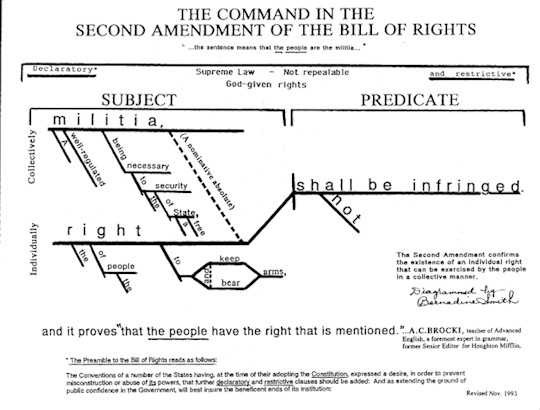
99 notes
·
View notes
Text
On Friday, June 24th, Justice Clarence Thomas got something he’s sought his entire adult life: recognition. Writing in support of the Supreme Court’s decision to overturn Roe v. Wade, Thomas recommended that the Court, as a next move, strike down a half century’s worth of “demonstrably erroneous” precedents establishing the right to contraception, the right to same-sex sexual conduct, and the right to same-sex marriage. On television and across the Internet, commentators took notice.
Insiders have long known that Thomas is the right’s pacesetter on the Court, laying out positions that initially seem extreme yet eventually get adopted. For years, Thomas pulled Justice Antonin Scalia—even, on occasion, Justice Anthony Kennedy and Chief Justice William Rehnquist—to the right on issues of crime and punishment. His opinions on campaign finance, once seen as recklessly deregulatory, now command a majority. In 1997, Thomas signalled his belief that the Second Amendment protects an individual’s right to bear arms, a fringe position that the Court would come to accept, eleven years later, in District of Columbia v. Heller. Even Thomas’s extraordinary claims, in a concurring opinion three years ago, about the racist foundations of abortion and birth control, found their way into a footnote in the Court’s recent abortion decision.
Despite this track record of stealth and success, liberals have often dismissed Thomas as stupid or a sellout, a patsy and a puppet, the Justice who cannot speak. That era is over. Yet Thomas’s significance far outstrips his captaincy of the Court’s war on liberalism. The most powerful Black man in America, Thomas is also our most symptomatic public intellectual, setting out a terrifying vision of race, rights, and violence that’s fast becoming a description of everyday life. It’s no longer a matter of Clarence Thomas’s Court. Increasingly, it’s Clarence Thomas’s America.
Like so much else in this country, the largeness of Thomas’s vision hinges on the smallest of claims: two clauses, all of thirty-eight words, in the second sentence of the Fourteenth Amendment. One is the due-process clause, which Thomas believes has been misread. In Thomas’s view, that misreading is a stain on the nation—and the reason for its fall.
The due-process clause, which prohibits the state from depriving anyone of “life, liberty, or property, without the due process of the law,” is the basis for the constitutional right to contraception, same-sex sexual conduct, same-sex marriage, and, until a few weeks ago, abortion. To some, it might seem strange that the clause contains an affirmative right to anything. Doesn’t it simply require that the state declare the law, set out a punishment for violating the law, charge a suspect for its violation, try him in court, and so on? That, as it happens, is Thomas’s view.
But there’s a second, more expansive, interpretation of the clause, which holds that certain rights are so intrinsic to “liberty,” so fundamental to what it means to be free, that they may never be abridged without a vital reason. It’s not enough for the state to dot its “i”s and cross its “t”s before it takes those rights away. The state should not take them away at all—unless it must. Among those rights is privacy, from which derive the rights to contraception and so on.
Most liberals and conservatives accept some version of this second interpretation—which is called “substantive due process”—but argue over which rights it protects. Liberals say abortion; conservatives say guns. Thomas rejects the entire idea of substantive due process. In his concurrence in Dobbs v. Jackson Women’s Health Organization, which overturned Roe v. Wade, Thomas calls substantive due process an “oxymoron” and a “legal fiction.” The due-process clause “guarantees process” only. Because it “does not secure any substantive rights,” he writes, “it does not secure a right to abortion.” The same goes for birth control, same-sex sexual conduct, and gay marriage.
Thomas’s argument against substantive due process is more than doctrinal. It’s political. In a speech before the Federalist Society and the Manhattan Institute which he gave in his second year on the Court, Thomas linked a broad reading of the due-process clause, with its ever-expanding list of “unenumerated” rights, to a liberal “rights revolution” that has undermined traditional authority and generated a culture of permissiveness and passivity. That revolution, which began with the New Deal and peaked in the nineteen-sixties, established the welfare state, weakened criminal law, and promulgated sexual freedom. The result has been personal dissipation and widespread disorder. Workers lose their incentive to labor. Men abandon wives and children. Criminals roam and rule the streets.
Today, the left ties itself into knots over whether it should defend sexual minorities, dismantle the carceral state, or fight for social democracy. For Thomas, these are three fronts of the same war. To reverse the downward spiral of social decadence and patriarchal decay, conservatives must undo the liberal culture of rights, starting with the unenumerated rights of substantive due process.
Thomas has never made a secret of his belief that the rights revolution hit Black people especially hard, destroying the Black patriarch whom Black women, children, and communities need for protection and instruction. “The salvation of our race,” he declared in 1985, depends upon “the strength and the will of black men.” But welfare “takes your manhood away,” as his grandfather told him. Sexual freedom takes husbands and fathers away, he told the students at a Black college in Savannah. Liberal criminal-justice policies take sons and brothers away: “The people who will suffer from our lofty pronouncements,” he writes in a dissent from a liberal Court opinion defending the rights of gang members, are those who live in Black neighborhoods. Because of their vulnerable position in American society, Black people have the greatest need of the stern patriarchal authority from which self-discipline and communal strength derive. Black fathers must become “the lion of children’s safety” and “the sheep of their peace.”
If misreading the due-process clause has caused the dissolution of Black men, another part of the Fourteenth Amendment offers their rehabilitation. For Thomas, the privileges-or-immunities clause, an obscure and mostly discarded provision that he has sought to resurrect for decades, promises the restoration of both his community and the country.
The privileges-or-immunities clause has its roots in the battle over slavery and emancipation. Before the Civil War, many Americans, particularly Southern slaveholders, argued that the Bill of Rights applied only to the federal government, leaving the states free to deny basic rights like the freedom of speech. With the privileges-or-immunities clause, which declares that “no State shall make or enforce any law which shall abridge the privileges or immunities of the United States,” the authors of the Fourteenth Amendment hoped to abolish the distinction between the rights of national and state citizenship. From now on, all Americans, especially Black Americans, would enjoy fundamental rights and freedoms—“privileges or immunities”—which would be secured by the federal government. “No general assertion of human rights can be of any practical value,” Frederick Douglass declared, while “there remains such an idea as the right of each State to control its own local affairs.”
A persuasive argument, but it was never accepted. In a series of cases during Reconstruction and its aftermath, the Court gutted the meaning of the privileges-or-immunities clause, forcing later activists and lawyers to rely upon the equal-protection clause and the due-process clause to advance the claims of Black people, women, and queer people. Thomas believes that this was a crucial mistake, and that the Court’s precedents on the privileges-or-immunities clause should be revisited. The clause “gives us a foundation for interpreting not only cases involving race,” he writes, “but the entire Constitution and its scheme of protecting rights.”
Lest we think that Thomas imagines anything like the rights that contemporary liberals defend, he made clear, in Saenz v. Roe (1999), that his interpretation of the privileges-or-immunities clause would protect only a narrow range of rights. Abortion is not one of them; neither is same-sex marriage. But he does include the right to bear arms, which he views as the right that precedes all others. Citing Justice Joseph Story, Thomas calls the right to bear arms “the palladium of the liberties of a republic.”
Liberals often claim that there is something hypocritical, if not perverse, about conservatives enshrining the right to bear arms without enshrining the right to abortion. Conservatives have an easy response: one right is found in the Constitution, both as tradition and text; the other is not. That’s what Justice Samuel Alito argues in Dobbs and in his concurrence, the day before, in New York State Rifle & Pistol Association, Inc., et al. v. Bruen, which struck down part of New York’s concealed-carry law.
Bodily autonomy is so foundational to contemporary understandings of freedom, however, that it’s hard to imagine a reason for denying it to women other than the fact that they are women. The fetish for guns, meanwhile, can seem like little more than a transposition of America’s white settler past onto its white suburban present, a reading Alito suggests at the end of his concurrence in Bruen:
In 1791, when the Second Amendment was adopted, there were no police departments, and many families lived alone on isolated farms or on the frontiers. If these people were attacked, they were on their own. . . . Today, unfortunately, many Americans have good reason to fear that they will be victimized if they are unable to protect themselves. And today, no less than in 1791, the Second Amendment guarantees their right to do so.
It’s worth comparing this passage with Thomas’s reading of the right to bear arms. Alito argues that the Second Amendment can be enforced, over and above state law, because of the due-process clause. Thomas roots his justification in the privileges-or-immunities clause, and in its backstory of slavery and abolition. Not only does that free Thomas from Alito’s white frontiersmen of yore but it also allows him to conjure the history of Black slaves arming themselves against their masters, and of Black freedmen protecting their families during Jim Crow. In his concurring opinion in McDonald v. Chicago (2010), a landmark guns case, he concludes with this resonant image:
One man [in 1919] recalled the night during his childhood when his father stood armed at a jail until morning to ward off lynchers. . . . The experience left him with a sense, “not ‘of powerlessness, but of the “possibilities of salvation” ’ ” that came from standing up to intimidation.
Thomas tells some of this history in Bruen. He dedicates a paragraph to the horror Chief Justice Roger Taney expressed—in the infamous Dred Scott decision declaring that Black people, enslaved or free, were not citizens of the United States—at the prospect of Black citizens having the right “to keep and carry arms wherever they went.” Mocked and misunderstood on Twitter, the paragraph reprises a longer story, which Thomas narrates in McDonald, of how terrified whites were of Black slave revolts in antebellum America. Citing the work of Herbert Aptheker, the Communist author of a pioneering history of slave rebellions, Thomas notes that white fears of Black revolt would be “difficult to overstate.” Those fears “peaked” during Reconstruction, to which Thomas devotes even more attention in his McDonald and Bruen opinions.
If there is any rational basis to the Court’s claim that people have the right to carry guns because they fear violence at the hands of a generalized other, it is in Thomas’s account of Black arms and Black history. Of the four pro-gun opinions in Bruen, Thomas’s is the only one in which we find an empirical example of a people’s justifiable need for armed self-defense in the face of violent enemies and government indifference. “Seeing that government was inadequately protecting them” under Jim Crow, he writes, Black people took up arms “to defend themselves” against white terrorists. The only history that can make sense of the Court’s position on guns, in other words, is that of race war.
In his second year on the Court, Thomas said that he was “proudly and unapologetically irrelevant and anachronistic.” Almost thirty years later, he has become what conservatives of every era seek to be: anachronistic and relevant.
Under Thomas’s aegis, the Court now assumes a society of extraordinary violence and minimal liberty, with no hope of the state being able to provide security to its citizens. In his Bruen concurrence, Alito extends Thomas’s history of Reconstruction to all modern America: “Many people face a serious risk of lethal violence when they venture outside their homes.” Like the Black citizens of Reconstruction, he argues, few of us should expect the police to protect us. “The police cannot disarm every person who acquires a gun for use in criminal activity,” Alito writes, “nor can they provide bodyguard protection for [New York] State’s nearly 20 million residents.”
Once upon a time, Alito’s claims of systemic danger and state incapacity would have been dismissed as the rantings of a mountain survivalist. But, after decades of mass shootings, his assertion that the cops can’t protect you reads as a corollary to the left’s warning that the cops won’t protect you. What makes both beliefs plausible is the failed state that America has become, with no small amount of help from Thomas, the right-wing Court, and elected officials from both parties.
Today’s felt absence of physical security is the culmination of a decades-long war against social welfare. In the face of a state that won’t do anything about climate change, economic inequality, personal debt, voting rights, and women’s rights, it’s no wonder that an increasing portion of the population, across all races, genders, and beliefs, have determined that the best way to protect themselves, and their families, is by getting a gun. A society with no rights, no freedoms, except for those you claim yourself—this was always Thomas’s vision of the world. Now, for many Americans, it is the only one available. ♦
84 notes
·
View notes
Link
23 notes
·
View notes
Text
Letters From An American
May 26, 2022
Heather Cox Richardson
One of the key things that drove the rise of the current Republican Party was the celebration of a certain model of an ideal man, patterned on the image of the American cowboy. Republicans claimed to be defending individual men who could protect their families if only the federal government would stop interfering with them. Beginning in the 1950s, those opposed to government regulation and civil rights decisions pushed the imagery of the cowboy, who ran cattle on the Great Plains from 1866 to about 1886 and who, in legend, was a white man who worked hard, fought hard against Indigenous Americans, and wanted only for the government to leave him alone.
That image was not true to the real cowboys, at least a third of whom were Black or men of color, or to the reality of government intervention in the Great Plains, which was more extensive there than in any other region of the country. It was a reaction to federal laws after the Civil War defending Black rights in the post–Civil War South, laws white racists said were federal overreach that could only lead to what they insisted was “socialism.”
In the 1950s, the idea of an individual hardworking man taking care of his family and beholden to no one was an attractive image to those who disliked government protection of civil rights, and politicians who wanted to dissolve business regulation pulled them into the Republican Party by playing to the mythology of movie heroes like John Wayne. Part of that mythology, of course, was the idea that men with guns could defend their families, religion, and freedom against a government trying to crush them. By the 1980s, the National Rifle Association had abandoned its traditional stance promoting gun safety and was defending “gun rights” and the Republican Party; in the 1990s, talk radio hosts like Rush Limbaugh fed the militia movement with inflammatory warnings that the government was coming for a man’s guns, destroying his ability to protect his family.
That cowboy image has stoked an obsession with guns and with military hardware and war training in police departments. It feeds a conviction that true men dominate situations, both at home and abroad, with violence. That dominance, in turn, is supposed to protect society’s vulnerable women and children.
In 2008, in the District of Columbia v. Heller decision, the Supreme Court said that individuals have a right to own firearms outside of membership in a militia or for traditional purposes such as hunting or self-defense, and dramatically limited federal regulation of them. Justice Antonin Scalia, who wrote the majority decision, was a leading “originalist” on the court, eager to erase the decisions of the post-WWII courts that upheld business regulation and civil rights.
In 2004, a ten-year federal ban on assault weapons expired, and since then. mass shootings have tripled. Zusha Elinson, who is writing a history of the bestselling AR-15 military style weapon used in many mass shootings, notes that there were about 400,000 AR-15 style rifles in America before the assault weapons ban went into effect in 1994. Today, there are 20 million.
For years now, Republicans have stood firmly against measures to guard Americans against gun violence, even as a majority of Americans support commonsense measures like background checks. Notably, after the Sandy Hook Elementary School massacre in 2012, when a gunman murdered 20 six- and seven-year-old students and 6 staff members, Republicans in the Senate filibustered a bipartisan bill sponsored by Joe Manchin (D-WV) and Pat Toomey (R-PA) that would have expanded background checks, killing it despite the 55 votes in favor of it.
Since Sandy Hook, the nation has suffered more than 3500 mass shootings, and Republicans have excused them by claiming they didn’t actually happen, or by insisting we need more guns so there will be “a good guy with a gun” to take out a shooter, or that we need to “harden targets,” or that we need more police in the schools (which has simply led to more student arrests), or as Senator Ted Cruz said today, to limit the number of doors in schools, or, as a guest on Fox News Channel personality Sean Hannity’s show said, to put “mantraps” and trip wires in the schools.
The initial story of what happened on Tuesday in Uvalde fit the Republican myth. Police spokespeople told reporters that a school district police officer confronted the shooter outside the building before he barricaded himself in a classroom, killing 19 and wounding 22 others in his rampage.
But as more details are emerging today, they are undermining the myth itself.
Robb Elementary School, where the murders took place, had already been “hardened” with the town investing more than $650,000 in security enhancements, but the shooter apparently entered through an unlocked door. The Uvalde police department consumes 40% of the town’s budget and has its own Special Weapons and Tactics (SWAT) unit. And yet, the stories that are emerging from Uvalde suggest that the shooter fired shots outside the school for 12 minutes before entering it and that he was not, in fact, confronted outside. Police officers arrived at the same time he entered the school, but they did not go in until after he had been in the building for four minutes. Seven officers then entered, but the lone gunman apparently drove them out with gunfire, and they stayed outside, holding back frantic parents, until Border Patrol tactical officers arrived a full hour later.
Parents tried to get the police to go in but instead found themselves under attack for interfering with an investigation. One man was thrown to the ground and pepper sprayed. U.S. Marshals arrested and handcuffed Angeli Rose Gomez, whose children were in the school and who had had time to drive 40 miles to get to them, for interfering as she demanded they do something. Gomez got local officers she knew to talk the Marshals into releasing her. Then she jumped the school fence, ran in, grabbed her two kids, and ran out.
A Texas Department of Safety official told CNN’s Wolf Blitzer tonight that the law enforcement officers at the school were reluctant to engage the gunman because “they could’ve been shot, they could’ve been killed.”
There are still many, many questions about what happened in Uvalde, but it seems clear that the heroes protecting the children were not the guys with guns, but the moms and the dads and the two female teachers who died trying to protect their students: Eva Mireles and Irma Garcia. News reports today say that Garcia’s husband, Joseph, died this morning of a heart attack, leaving four children.
Last week, in the aftermath of the deadly attack on a supermarket in Buffalo, New York, Democrats in the House of Representatives quickly passed a a domestic terrorism bill. Senate majority leader Chuck Schumer (D-NY) tried to get the Senate to take it up today. It would have sparked a debate on gun safety. Republicans blocked it. In the aftermath of Tuesday’s massacre, only five Republicans have said they are willing to consider background checks for gun purchases. That is not enough to break a filibuster.
Last night, Texas candidate for governor Beto O’Rourke confronted Texas governor Greg Abbott at a press conference. Last year, Abbott signed at least seven new laws to make it easier to obtain guns, and after the Uvalde murders, he said tougher gun laws are not “a real solution.” O’Rourke offered a different vision for defending our children than stocking up on guns. "The time to stop the next shooting is right now, and you are doing nothing," O'Rourke said, standing in front of a dais at which Abbott sat. "You said this is not predictable…. This is totally predictable…. This is on you, until you choose to do something different…. This will continue to happen. Somebody needs to stand up for the children of this state or they will continue to be killed, just like they were killed in Uvalde yesterday.”
Uvalde mayor Don McLaughlin shouted profanities at O'Rourke; Texas Republican lieutenant governorDan Patrick told the former congressman, "You're out of line and an embarrassment”; and Senator Ted Cruz told him, “Sit down.”
But this evening the New York Yankees and the Tampa Bay Rays announced they would use their social media channels not to cover tonight’s game but to share facts about gun violence. “The devastating events that have taken place in Uvalde, Buffalo and countless other communities across our nation are tragedies that are intolerable.”
15 notes
·
View notes
Photo
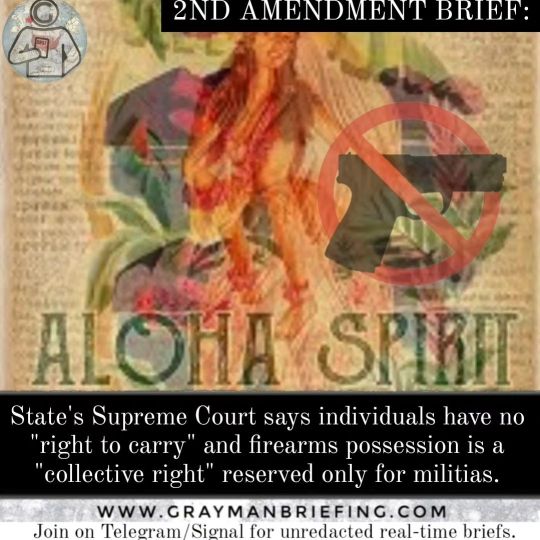
2nd Amendment Brief: Hawaii & National The Hawaii Supreme Court has rendered a ruling in the case of State v. Wilson finding "the right of the people to keep and bear arms... does not guarantee individual rights” and is instead a "collective right" that is relevant only in the context of militia service. The court said "Hawaiʻi has never recognized a right to carry" and "there is no individual right to keep and bear arms...so there is no constitutional right to carry a firearm in public for possible self-defense." The court compared the 2nd Amendment and the State's constitution and found that they both apply only to militias or military units claiming that only a "well regulated militia" has a right to "bear arms" and that the court will "limit the use of deadly weapons to a military purpose". The court cited the "Aloha Spirit" as justification for rejecting prior rulings by the U.S. Supreme Court (SCOTUS) in District of Columbia v. Heller where the Second Amendment was affirmed to protect individual right to arms, the McDonald v. Chi... 》Poll: Did Hawaii get it right or did the violate the U.S. Constitution?
0 notes
Text
The Hawaiian Supreme Court's Gun Ruling Is a Bit Insurrectionist
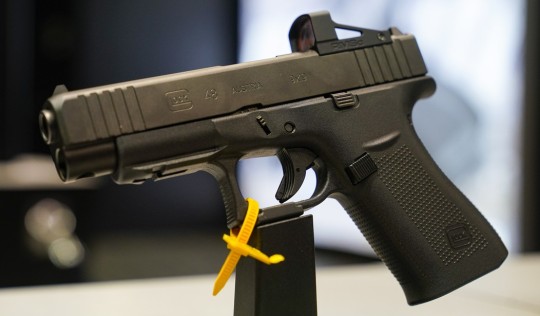
Last Sunday, ABC News’ George Stephanopoulos shut down an interview with Sen. J.D. Vance (R-OH) over the perception that the Ohio Republican was open to presidents defying Supreme Court rulings and ignoring the rule of law. It was a cheap shot that even Vance's detractors found ridiculous. Vance offered a hypothetical of when such a time would be appropriate, like the Court ruling that the president of the United States cannot fire a general. That would be an illegitimate ruling. It was a hypothetical that Vance prefaced by saying he hoped something like this would never veer into the realm of reality. Well, it happened in Hawaii at the state Supreme Court level.
The Aloha State overturned a lower court’s ruling involving a man, Christopher Wilson, who was charged with carrying a firearm without a permit. The court’s ruling was that this lower court decision was wrong because Hawaii’s state constitution does not protect gun rights. So, the Bill of Rights doesn’t exist on the island. Also, were these jurists informed of the Bruen and Heller decisions? The Hawaiian Supreme Court went rogue and, dare I say, struck an insurrectionist tone (via The Reload):
I’m sorry to inform the Hawaii Supreme Court, but “the spirit of Aloha” does not currently supersede the Second Amendment. Their interpretation against an individual right to bear arms is wrong and should be overturned. https://t.co/sHtFhemSMG— AG (@AGHamilton29) February 8, 2024
Recommended
The Aloha State’s highest court upheld a man’s gun-carry conviction on Wednesday after rejecting landmark decisions from the Supreme Court of the United States (SCOTUS).
Hawaii’s Supreme Court reversed a lower court decision that found charges leveled against Christopher Wilson for carrying a gun without a permit violated his rights. Instead, the court ruled its state constitution provides no gun-rights protections whatsoever. That’s despite it including a provision protecting the right of the people to keep and bear arms identical to the one in the federal Constitution.
“Article I, section 17 of the Hawaiʻi Constitution mirrors the Second Amendment to the United States Constitution,” the Hawaiian court wrote in Hawaii v. Wilson. “We read those words differently than the current United States Supreme Court. We hold that in Hawaiʻi there is no state constitutional right to carry a firearm in public.”
The ruling directly contrasts with the core holdings at the center of SCOTUS’s gun rights precedents. The state supreme court’s ruling explicitly rejects the federal supreme court’s findings in 2008’s District of Columbia v. Heller and 2022’s New York State Rifle and Pistol Association v. Bruen. The lower court’s straightforward rejection of the higher court’s Second Amendment jurisprudence could provoke SCOTUS to take up the case and issue a rebuke, as it did when the Massachusetts Supreme Court ruled protections don’t extend to modern weapons in 2016’s Caetano.
“There seems to us no doubt, on the basis of both text and history, that the Second Amendment conferred an individual right to keep and bear arms,” the majority wrote in Heller. Similarly, in Bruen, SCOTUS ruled “the Second and Fourteenth Amendments protect an individual’s right to carry a handgun for self-defense outside the home.”
The court cited HBO’s The Wire in the ruling, too.
“As the world turns, it makes no sense for contemporary society to pledge allegiance to the founding era’s culture, realities, laws, and understanding of the Constitution. ‘The thing about the old days, they the old days.’”
Even worse, the judicial body said, “The spirit of Aloha clashes with a federally-mandated lifestyle that lets citizens walk around with deadly weapons during day-to-day activities.”
Having island spirit isn’t a license to overrule the US Constitution—is this middle school? The Left has been stunted time and again from passing new gun laws, so I guess their judges are now creating their own fiefdoms via ad hoc law. Mr. Vance should use this as an example of courts going rogue.
What an insane ruling that also captures the immaturity of the Left. They can’t win in the court of public opinion, so they throw a tantrum and, in the process, imbrue and degrade the very institutions they claim to protect. At the federal level, you’ve already seen the damage done in the Justice Department’s anti-Trump crusade.
Recommended
Trending on Townhall Videos
0 notes